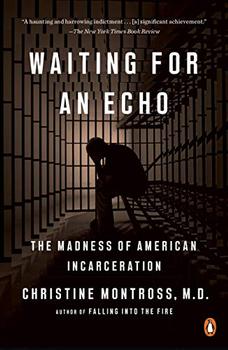Summary | Excerpt | Reviews | Beyond the Book | Readalikes | Genres & Themes | Author Bio

Critics' Opinion:
Readers' Opinion:
First Published:
Jul 2020, 352 pages
Paperback:
Jul 2021, 352 pages
 Book Reviewed by:
Book Reviewed by:
Lisa Butts
Buy This Book
"What about the prisons?" she asked me, ignoring the options I had laid out for her. "I feel like all of the most interesting doctors I know work in the prisons."
I gave little thought to her comment at the time. Why would I want to work in the prisons? Why devote my time and attention to people who had committed crimes when there were so many innocent people who needed care?
And so I chose, accepting a position as an attending psychiatrist on the Intensive Treatment Unit of a freestanding psychiatric hospital in Rhode Island. It is a job that I have loved and one that I still hold—and love—today.
The Intensive Treatment Unit is the psychiatric version of the ICU. The patients I treat are psychotic, plagued by voices or visions or paranoid delusions. Or they are in the throes of mania. Or they are actively trying to harm themselves or others. Their lives are replete with hardship. Many of my patients are homeless. Some are drug addicted. Nearly all have been victims of significant trauma. They have few safe havens, and the illnesses that besiege their minds wage a relentless war on their stability, their happiness, their safety.
It turns out that many of them also serve time in jail and prison. Sometimes patients are admitted to my care in the hospital days or even hours after being released from jail. Other times the nurses or I notice that we haven't seen one of our patients in an unusually long time and we check the Rhode Island court database only to learn that he or she has been arrested and is serving time.
Frequently the offenses that my patients recount to me after their release, or that I read about in court documentation, are indistinguishable from the behaviors that precipitate their hospital admissions. They shout in Starbucks or they linger outside stores asking for change. They steal food or subsistence items like deodorant or tampons off convenience-store shelves. They are found with drug paraphernalia. They call 911 with paranoid complaints. If in these moments the police are called, the criminal legal process begins.
Our cultural belief about mentally ill people is that they are more apt to commit crimes than are people who are mentally well. This is not the case. People with psychiatric illnesses are far more likely to be victims of crimes than they are to be perpetrators. Rarely are intersections between our mentally ill citizens and police gravely serious, involving real threats or significant violence. There are chilling exceptions, of course— Andrea Yates drowning her five children, James Holmes killing twelve in a Colorado movie theater—but these incidents, thankfully, are few and far between.
Much more often the acts for which my patients are incarcerated are neither dangerous nor violent. My patients are arrested most frequently for transgressions rooted more in their psychiatric symptomatology and poverty than in criminal intent. The distinction I once imagined between hospital and prison populations exists only faintly, when it exists at all.
My relationships with my patients—who show fortitude in the face of unfathomable challenges—have substantially complicated the binary view I once held: the view that there were people who committed crimes and then there were innocent people, and that only one of those groups was deserving of my compassion and care. Nearly a decade after my residency-training director's suggestion, I found myself compelled to learn more about how the legal system responded to—and interacted with—mentally ill citizens who became involved with police.
I wanted to better understand how—and at what points—decisions and outcomes branched for mentally ill people in the legal system. So I began performing competency-to-stand-trial evaluations in jails, situating myself on the front lines of the confluence of psychiatric illness and law enforcement. And I became a student of the system. I visited prisons and jails in America and abroad. I read stacks of books on law and on punishment. I interviewed experts in the field of corrections. And I listened to the voices of people who had served time in our nation's correctional facilities. In so doing, I began to see how poorly suited the American prison system is for those with mental illness and how the system's general practices indiscriminately shift large numbers of people who belong in therapeutic environments into punitive ones.
From Waiting for an Echo by Christine Montross, published by Penguin Press, an imprint of Penguin Publishing Group, a division of Penguin Random House LLC. Copyright © 2020 by Christine Montross.





The House on Biscayne Bay
by Chanel Cleeton
As death stalks a gothic mansion in Miami, the lives of two women intertwine as the past and present collide.

The Flower Sisters
by Michelle Collins Anderson
From the new Fannie Flagg of the Ozarks, a richly-woven story of family, forgiveness, and reinvention.

The Funeral Cryer by Wenyan Lu
Debut novelist Wenyan Lu brings us this witty yet profound story about one woman's midlife reawakening in contemporary rural China.
Your guide toexceptional books
BookBrowse seeks out and recommends the best in contemporary fiction and nonfiction—books that not only engage and entertain but also deepen our understanding of ourselves and the world around us.